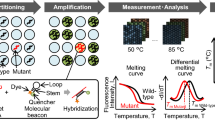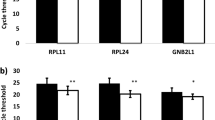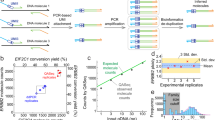Abstract
A quantitative polymerase chain reaction (PCR) method for determining concentrations of mRNA for the cyclic AMP (cAMP)-binding protein RI alpha, a regulatory subunit of cAMP-dependent protein kinase, was developed using site-directed mutagenic primers and mix-melt PCR. The PCR product for RI alpha mRNA was modified to include an EcoRV restriction site for use as an internal standard. This mutant utilised the same primers as the target mRNA and differed in sequence by only four bases. As only one of these base changes results in a purine/pyrimidine switch the effective change in labelling with [32P]dCTP was less than 0.5%. Reverse transcription of mRNA was performed and quantitative PCR was carried out using fixed levels of mutant RI alpha vs varying amounts of both normal RI alpha sequence of known concentration and unknown samples. Validation of the technique using rigourous quality control established that reverse transcription, determined by incorporation of labelled nucleotides, gave intra- and interassay variations of 16.2 and 9.3% respectively. Using crossover evaluation of cDNA concentrations with cloned RI alpha sequences as controls intra- and interassay variations of 14.3% and 4-8% respectively were obtained. Using compounded errors, the limits of precision for this technique demonstrate that values that are altered by 50% or more represent a true alteration in mRNA levels between samples tested. This value compares favourably to similar values for radioimmunoassays of between 10% and 30% precision. Analysis of a series of patient samples during routine follow-up of treatment demonstrated clear changes in mRNA levels. Using site-directed mutagenesis to establish a quantitative PCR-based assay for expression of mRNA this study demonstrates the potential usefulness and some limitations of quantitative PCR for applications within a clinical biochemistry laboratory. However, based on compounded error, values that vary by less than 50% within assays, and by less than 70% in separate assays could not be clearly separated. Assessment of paired patient samples has demonstrated clear changes in mRNA for the target protein RI alpha. With the use of normal quality control procedures this study has established that the degree of reproducibility of this quantitative PCR technique would allow assessment of mRNA levels for markers of interest in clinical samples in a routine laboratory context.
This is a preview of subscription content, access via your institution
Access options
Subscribe to this journal
Receive 24 print issues and online access
$259.00 per year
only $10.79 per issue
Buy this article
- Purchase on Springer Link
- Instant access to full article PDF
Prices may be subject to local taxes which are calculated during checkout
Similar content being viewed by others
Author information
Authors and Affiliations
Rights and permissions
About this article
Cite this article
Bartlett, J., Hulme, M. & Miller, W. Analysis of cAMP RI alpha mRNA expression in breast cancer: evaluation of quantitative polymerase chain reaction for routine use. Br J Cancer 73, 1538–1544 (1996). https://doi.org/10.1038/bjc.1996.290
Issue Date:
DOI: https://doi.org/10.1038/bjc.1996.290



